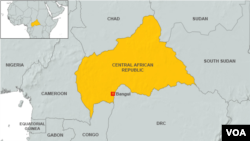BANGUI —
Four young Muslims were killed in the Central African Republic capital Bangui over the weekend, among them a son and a brother of an important community leader, the mayor of the city's 3rd Arrondissement, or district. Their friends and relatives are asking why international peacekeepers are not permanently stationed on the frontline between their community and a neighboring hostile district.
Grave diggers prepare the earth inside the compound of Atehirou Balladodo, the mayor of Bangui's third district. The bodies of the mayor's son and brother could not be buried at the Muslim cemetery because it is in the neighboring Boeing district, now controlled by hostile forces.
On Sunday, friends and relatives filed past the bodies, laid out on white sheets, and hundreds of people attended a brief religious ceremony outside the house.
Two other young men were also killed Saturday. All four were part of the Muslims' self-defense force. Balladodo says they were called out three times on Saturday to respond to threats.
"The first attack was at 6 a.m., the second at 10:30 and at about 1:30 p.m., my boys went out again. African Union peacekeepers arrived on the scene for the first attack and so did the French peacekeepers, at 10 a.m., but they were not there when the third attack came - when the two boys died," said Balladodo.
A relative, Mahamadou Baba, said the French peacekeepers, known as Sangaris, should have responded more strongly.
"Sangaris were there and they were fired at by the anti-balaka militia and by ex-Central Africa army soldiers. They fired back and advanced to the Boeing district, and stayed in the area a couple of hours with their helicopters flying over, but I don't understand why the militia fighters weren't dislodged," said Baba.
"We're astonished," he said, "that there's no permanent presence of Sangaris, or of the African Union mission MISCA, on that side of our district, because that's the hotspot where most of the attacks come from."
There are only about 10,000 to 15,000 Muslims left in Bangui out of an estimated 150,000 before communal violence flared last year. And nearly all of them are forced to live in a ghetto, the so-called Kilometre Cinq area of the 3rd Arrondissement.
A spokesman for the French mission, Lieutenant Colonel Thomas Mollard,said that while the Sangaris do not have a base in the 3rd Arrondissement, the mission has a permanent presence and has patrols there night and day. MISCA, he poineds out, does have a base in the district.
A MISCA officer acknowledged that their base is not on the side facing the Boeing district, which local people say is the front line.
Asked why the international forces are not permanently at this hotpoint, Lt. Col. Mollard said the C.A.R. is a country of rumors and while local people may perceive threats as coming from Boeing district, the attackers might in fact be from another district. He confirmed there has been a resurgence of tension in Bangui during the past few days.
Grave diggers prepare the earth inside the compound of Atehirou Balladodo, the mayor of Bangui's third district. The bodies of the mayor's son and brother could not be buried at the Muslim cemetery because it is in the neighboring Boeing district, now controlled by hostile forces.
On Sunday, friends and relatives filed past the bodies, laid out on white sheets, and hundreds of people attended a brief religious ceremony outside the house.
Two other young men were also killed Saturday. All four were part of the Muslims' self-defense force. Balladodo says they were called out three times on Saturday to respond to threats.
"The first attack was at 6 a.m., the second at 10:30 and at about 1:30 p.m., my boys went out again. African Union peacekeepers arrived on the scene for the first attack and so did the French peacekeepers, at 10 a.m., but they were not there when the third attack came - when the two boys died," said Balladodo.
A relative, Mahamadou Baba, said the French peacekeepers, known as Sangaris, should have responded more strongly.
"Sangaris were there and they were fired at by the anti-balaka militia and by ex-Central Africa army soldiers. They fired back and advanced to the Boeing district, and stayed in the area a couple of hours with their helicopters flying over, but I don't understand why the militia fighters weren't dislodged," said Baba.
"We're astonished," he said, "that there's no permanent presence of Sangaris, or of the African Union mission MISCA, on that side of our district, because that's the hotspot where most of the attacks come from."
There are only about 10,000 to 15,000 Muslims left in Bangui out of an estimated 150,000 before communal violence flared last year. And nearly all of them are forced to live in a ghetto, the so-called Kilometre Cinq area of the 3rd Arrondissement.
A spokesman for the French mission, Lieutenant Colonel Thomas Mollard,said that while the Sangaris do not have a base in the 3rd Arrondissement, the mission has a permanent presence and has patrols there night and day. MISCA, he poineds out, does have a base in the district.
A MISCA officer acknowledged that their base is not on the side facing the Boeing district, which local people say is the front line.
Asked why the international forces are not permanently at this hotpoint, Lt. Col. Mollard said the C.A.R. is a country of rumors and while local people may perceive threats as coming from Boeing district, the attackers might in fact be from another district. He confirmed there has been a resurgence of tension in Bangui during the past few days.




